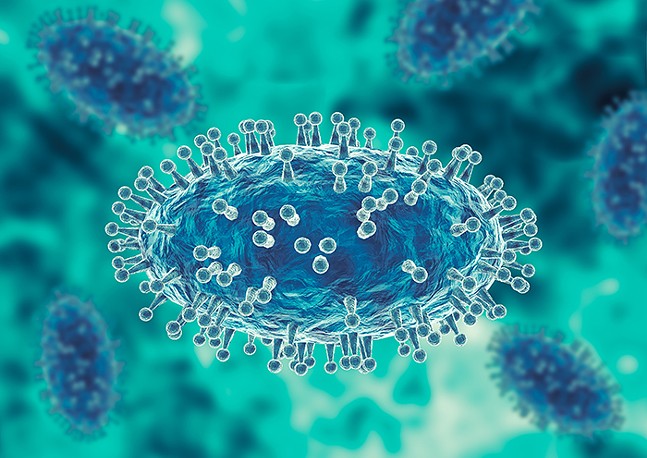The Allegheny Health Department has confirmed that three county residents have been diagnosed with monkeypox.
“The Health Department has been monitoring and working with our state and federal public health agencies since the monkeypox virus started appearing in countries that do not typically experience cases of this illness,” explains ACHD Director Dr. Debra Bogen. “The department is prepared to assist both residents and our community partners as cases of this virus are diagnosed.”
According to a July 1 ACHD release, “Public health nurses are in the process of providing the patients with guidance and resources. The department has begun the contact tracing process with the affected individuals.”
As of June 30, 2022, according to the release, there have been three confirmed cases of monkeypox, which is a kind of orthopoxvirus, in Allegheny County, all within the past 24 hours. The individuals are all adult males in their 20s and 30s. None of the patients required hospitalization. All are currently in isolation at home.
“The ACHD has a highly honed case investigation process and is ready to help contain any possible community spread of the monkeypox virus in Allegheny County,” remarks ACHD Chief Epidemiologist LuAnn Brink. “To contain the virus effectively and efficiently, we need residents to work with our nurse case investigators to determine the source of the infection and if it has spread to others. We appreciate any and all assistance.”
“The contagiousness of monkeypox is very different from COVID-19,” says ACHD Clinical Services Deputy Director Dr. Barbara Nightingale. “It is spread through much closer contact with someone who has the illness.”
According to ACHD, monkeypox is contracted when an individual comes in prolonged contact with the sores, scabs, respiratory droplets, or oral fluids of an infected person. Most infections have occurred through close, intimate situations, such as cuddling, kissing, and sexual contact. Other possible avenues for infection have occurred by encountering contaminated materials, such as clothing, bedding, and other linens used by an infected person.
Symptoms of monkeypox include fever, chills, headache, muscle aches, fatigue, and swollen lymph nodes. A rash typically develops a few days after the initial symptoms. However, not all individuals infected with monkeypox develop any symptoms prior to rash, so ACHD says it's critical that those who think they were exposed to the virus get tested to limit the spread of the disease.
ACHD also reports that health care systems, clinics, and other care providers began testing patients who presented with possible monkeypox symptoms several weeks ago. Testing is available at the ACHD’s Public Health Clinic, as well as throughout the county, with more commercial labs being able to test for the virus in the coming weeks, the county says.
ACHD recommends that individuals interested in being tested for monkeypox contact their health care provider and make an appointment, especially if they are experiencing flu-like symptoms and have a new rash/sores, or if they have been in close contact with an infected person.
Testing is also available at the ACHD’s Public Health Clinic located at 1908 Wylie Ave. in the Hill District. Clinic hours are Monday, Tuesday, Thursday, and Friday from 8 a.m. to 3:30 p.m., and Wednesdays from noon to 7:30 p.m. To learn more about the Public Health Clinic, visit alleghenycounty.us or call 412-578-8081.
The Public Health Clinic also has access to medication and vaccines for individuals identified during disease investigation who may benefit from their administration.
ACHD says the most effective modes of prevention against contracting monkeypox are:
- Practice safe sex, including the use of condoms and dental dams
- Avoid contact with bedding and other materials contaminated with the virus
- Avoid contact with people who may be infected
- Avoid skin-to-skin contact with someone with a rash
- Wash your hands with soap and water
- Use personal protective equipment when caring for infected persons
Monkeypox is not related to chickenpox, but, in some cases, may present symptomatically like the typical childhood illness, according to the release. The chickenpox vaccine does not protect against the monkeypox virus. Preliminary research has shown that residents who have been recipients of the smallpox vaccine may experience some minor protection against severe outcomes from the monkeypox virus, the health department says.
To date, 396 people in the United States have tested positive for monkeypox, with 13 of those diagnoses coming from Pennsylvania. The first case of monkeypox in Pittsburgh was reported on June 29 by North Side's Central Outreach Wellness Center.
The Health Department says its nurses are available to answer questions, as well as provide guidance and resources to anyone who believes they have come in contact with monkeypox. They can be contacted by calling 412-687-ACHD (412-687-2243).
To learn more about monkeypox, you can also visit the CDC’s website at cdc.gov/monkeypox.


